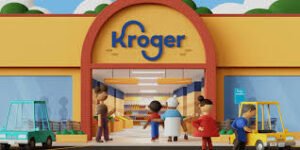Kroger: Innovations, Sustainability, and Growth
Kroger is a major player in the retail industry. Known for its wide range of products and extensive reach, Kroger is a household name in the United States. This article explores Kroger’s history, business model, innovations, and its impact on the retail sector.

A Brief History of Kroger
Kroger’s story began in 1883. Bernard Kroger, the company’s founder, opened a small grocery store in Cincinnati, Ohio. His goal was simple: to offer quality products at fair prices. This vision quickly resonated with consumers. Within a few years, Kroger expanded, opening more stores in the Cincinnati area.
The company’s growth did not stop there. In the early 1900s, Kroger began to acquire other grocery chains. This strategy helped the company to expand its footprint across the United States. By the mid-20th century, Kroger had become one of the largest grocery chains in the country.
Kroger’s Business Model
Kroger operates on a straightforward business model. The company combines large-scale retail operations with a focus on customer satisfaction. Kroger’s stores offer a wide range of products, including groceries, pharmaceuticals, and household items.
One key aspect of Kroger’s business model is its emphasis on private-label products. These store-brand items often provide better value than national brands. Kroger has invested heavily in developing and marketing its private-label products. This investment helps to build customer loyalty and drive sales.
Innovations and Technology
Kroger has been a leader in adopting new technologies. The company understands that innovation is crucial to staying competitive in the retail market. For example, Kroger has implemented advanced inventory management systems. These systems help ensure that products are always in stock and reduce waste.
Another area where Kroger has embraced technology is its online shopping platform. In recent years, the company has expanded its e-commerce offerings. Kroger’s online platform allows customers to shop for groceries and have them delivered directly to their homes. This convenience is a significant draw for busy consumers.

Kroger has also invested in self-checkout technology. Self-checkout lanes are now common in many Kroger stores. This technology speeds up the checkout process and reduces lines, enhancing the overall shopping experience.
Kroger’s Commitment to Sustainability
Sustainability is an important focus for Kroger. The company has implemented several initiatives aimed at reducing its environmental impact. For instance, Kroger has committed to reducing greenhouse gas emissions. The company is working towards using renewable energy sources in its operations.
In addition, Kroger has made efforts to reduce food waste. The company has implemented programs to donate surplus food to local food banks. This initiative helps address food insecurity and reduces the amount of waste that ends up in landfills.
Kroger is also focused on sustainable sourcing. The company has pledged to source seafood, palm oil, and other key ingredients responsibly. These efforts are part of Kroger’s broader strategy to operate in an environmentally and socially responsible manner.
Kroger Community Engagement
Kroger is deeply involved in the communities it serves. The company supports various local initiatives and charities. Through the Kroger Foundation, the company provides funding for programs that address hunger, health, and education.
Kroger’s commitment to community engagement extends beyond financial contributions. The company encourages its employees to volunteer in their local communities. This volunteerism helps strengthen community ties and demonstrates Kroger’s dedication to social responsibility.
Challenges and Competition
Despite its success, Kroger faces several challenges. The retail industry is highly competitive, with numerous players vying for market share. Companies like Walmart, Target, and Amazon are significant competitors. These competitors offer similar products and services, often at lower prices.
Additionally, the rise of online shopping presents a challenge for traditional brick-and-mortar retailers. While Kroger has made strides in e-commerce, it must continually adapt to changing consumer preferences and technological advancements.
Another challenge is maintaining customer loyalty in a crowded market. With so many options available, customers can easily switch between retailers. Kroger must continue to focus on quality, value, and customer service to retain its customer base.
Future Outlook – Kroger
Looking ahead, Kroger is poised to continue its growth. The company’s focus on innovation, sustainability, and community engagement positions it well for the future. Kroger’s investment in technology and e-commerce is expected to pay off as more consumers shift to online shopping.
The company is also likely to continue expanding its product offerings and services. By staying attuned to consumer trends and preferences, Kroger can remain competitive and relevant in the ever-changing retail landscape.
In conclusion, Kroger has established itself as a major force in the retail industry. From its humble beginnings in Cincinnati to its current status as a retail giant, Kroger has grown by focusing on customer satisfaction, embracing innovation, and committing to sustainability. As the retail landscape continues to evolve, Kroger’s ability to adapt and meet the needs of its customers will be crucial to its ongoing success.

[…] By openly communicating, setting boundaries, and focusing on what truly matters, individuals and businesses can uphold fidelity even in difficult […]